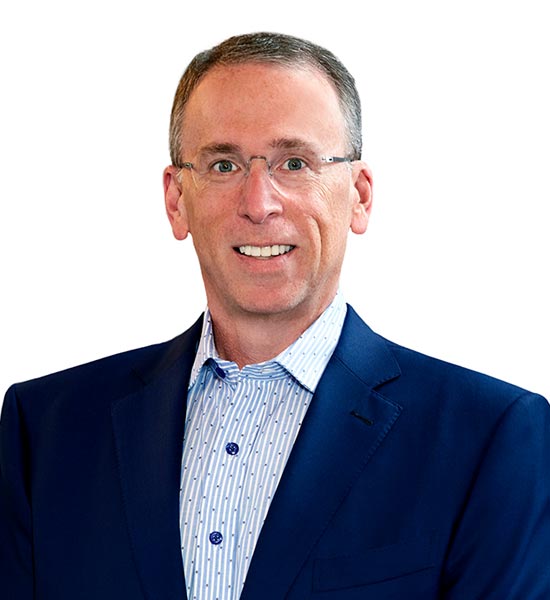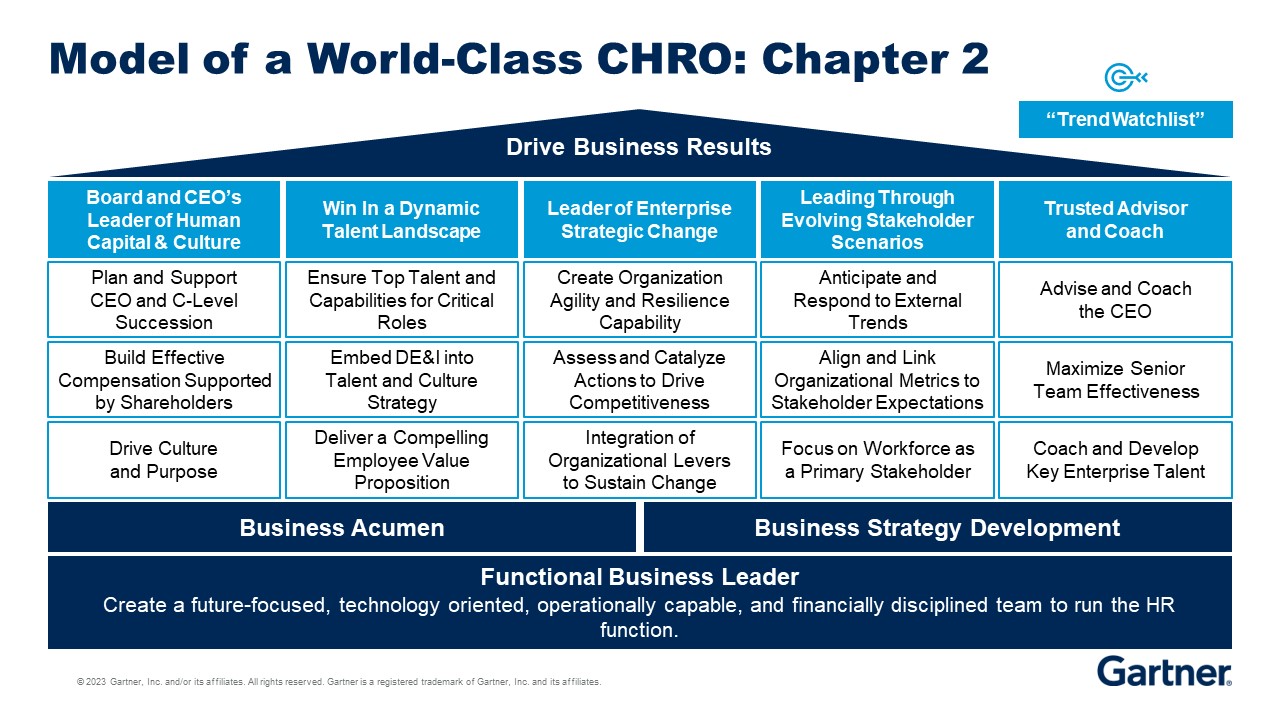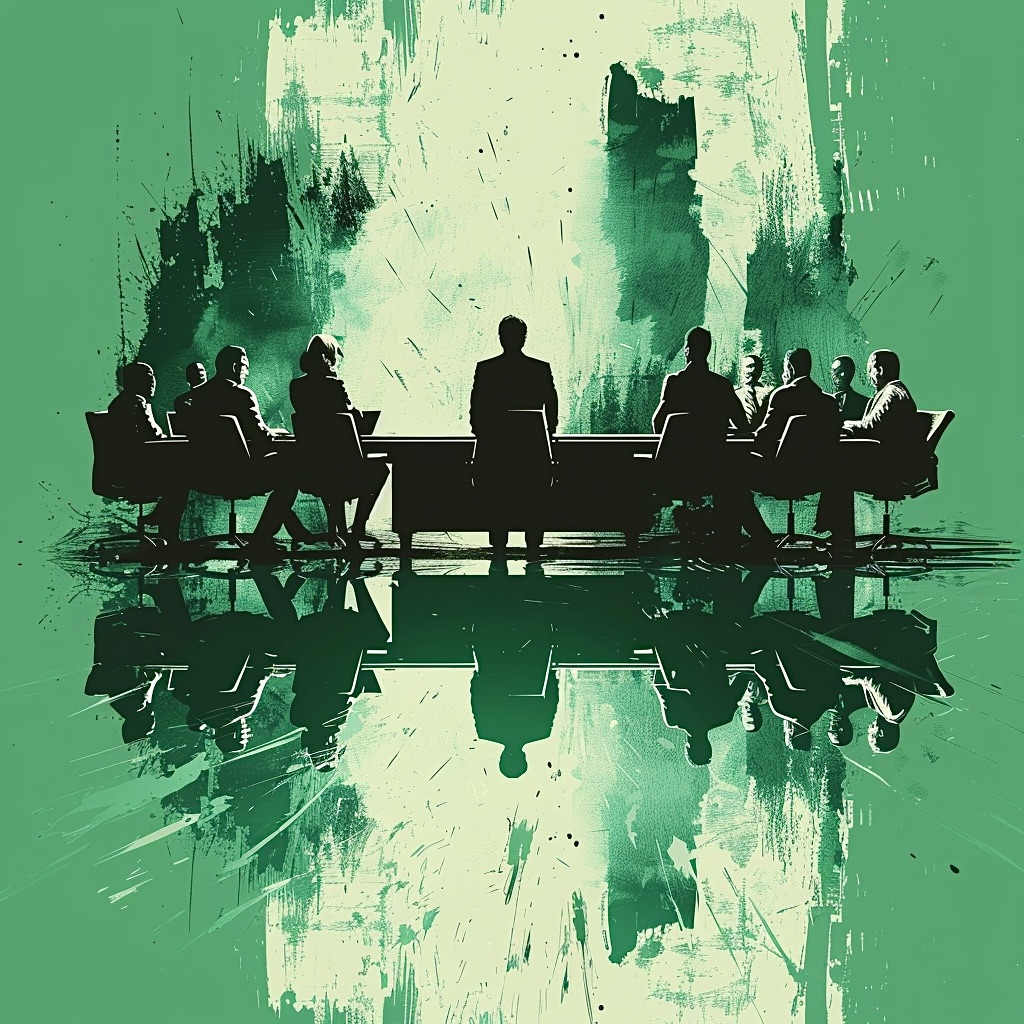Crenshaw CHRO Spotlight
CHRO Spotlight: Kevin Cox Part 2

Part 2 of our conversation with Kevin Cox, CHRO of GE, and co-developer of the Model of a World Class CHRO: Chapter Two
In the second part of our series, Bill Glenn speaks with Kevin Cox about business model understanding for HR leaders. They discuss the benefits of an external advisor, what it means to have an enterprise view, and the future of leadership.
Bill Glenn: You know, one of the more interesting areas in the model is how HR teams in general could evolve and develop a relationship with their business partners similar to how CHROs, like you and Carol Surface have built with your CEOs. And our customers are talking to us about this.
Willem Genece, who, you know well and heads up our coaching practice, speaks about Cobbler's Children's Syndrome- the idea that HR folks spend a great deal of time and energy ensuring that executives keep building and scaling their leadership skills, but may not be investing enough in themselves. So challenge me a little on this, and I know it sounds somewhat selfish from Crenshaw. Why wouldn’t HR executives invest in an experienced coach and advisor to help build their own leadership and influence skills to be even more effective Business partners.
Kevin Cox: Hard to challenge on something I think I agree with. First off, Willem is such a wise guy. I mean, he really is. I've had the fortune of knowing him for pretty close to 20 years. His insights are extraordinary. So, I'm not surprised that you quote him on something like this. Cobbler's kids, I think is a fair point. It comes from a good place. I think most of us believe that we're principally here to sort of focus on the strength and the progress of the executives or the teams that we're working with. Nothing wrong with that. We put a lot of our energy into doing something like that and we don't put as much energy or maybe any energy into doing that for ourselves.

So for starters, if it's implied in your question, I think it's a great idea for HR to invest more in itself. I have personally benefited enormously from external advisors. Now, I've had a lot of mentors that I sort of got for free. But I've had paid advisors who are absolutely essential to whatever success I've been able to enjoy. They have pushed me, argued with me, got me out of my own way, challenged me and they've made me better. So I would be here, first of all, to endorse. I'm a personal fan of the subject and I've used it and I've paid for it and I think more of that should happen. Good way to think about it is maybe we had to stop thinking about it as a cost, which a lot of us do. We've only got so much of a budget. You're going to put that budget toward other places first, right? Maybe your general managers, your P&L leads or something like that. We got to think about it like [how] you frame the question, it's an investment. It's not a cost, it's an investment. It's related to the Model of a World Class CHRO: Chapter Two.
The marriage of this model and the coaching that you're talking about would be perfect because the coach could be moving you toward a particular outcome like the model. I'm not sure that many people can just sort of simply read the model and become it, right. I think they need some help with it. So an external advisor [or] an external coach, could absolutely close those gaps, take a look at the model and decide where are the gaps, and then what can we do together to close some of those gaps.

Bill Glenn: Some of the work that you and Carol refer to is having the HR function and the people in HR become more familiar with the business models that they're involved in.
Now, we've known each other for some time and one of the things I love about the HR folks at Pepsi is they really understood the business model because a lot of them started in the plant. So they saw how the product was manufactured, loaded [and] distributed. [They] knew the contracts of the unions. How do you translate that or what's the model to teach, to have the HR folks experience the business model? Know how the money flows and how the enterprise succeeds?
Kevin Cox: I'll tell you a story I don't think I've ever told you before. When I crossed over from Pepsi to American Express, and I had a fantastic 14 year run at Amex that I wouldn't trade for anything, but the beginning stages were not smooth. I remember in my onboarding, let's call it the first two months I was there. I would say most of the executives of American Express looked at me just like you described but maybe with a negative tint. They were looking at what does this guy who grew up with or comes to us from labor unions, gritty manufacturing plants, trucking systems, distribution, bottling plants, you know, very gritty work way down from the sort of the highfalutin financial services world that Amex occupied. So, I was asked to spend some time with one of the P&L leaders in the early part of my onboarding. I'm ready for this conversation. I said to him, tell me a little bit about your business… and Bill, he sniffed the air and just personified arrogance. He looked at me and he said, “well, to be honest with you, I wouldn't even know where to begin.”
And I looked at him in the eye and I said, “well, why don't you start with how you make money?” And his entire attitude instantly changed. He had three business lines that he ran and he took me through basically the income statement of each of those three businesses, and we ended up becoming good friends from that rough start. It actually didn't take very long at all to where we're having breakfast together once a month and this sort of thing. The moral of the story to me is there's only one income statement. There's only one balance sheet. I mean that you can have different industries, different businesses. They can behave differently as you kind of move from the top line to the bottom line.
But my advice to HR people all over the place, including here at GE, is do you really understand how the businesses that you work with makes money? And if you align strategies and your efforts and your priorities behind helping those general managers do that better or do that more frequently- You are going to be more relevant. You're going to be more useful, and you're going to make a bigger difference. It's easy if you can walk a plant and jump on a truck and you talk about liners. There's no question that sort of going to Gemba as we talk about it here in GE’s lean environment. That's where all the truth lives. It lives at the front line closest to your customer. So, you certainly ought to spend a good bit of time there. To check your own instincts. It can be done. I'm here to tell you it can be done in a blue-collar environment, a white-collar environment, whatever collar you might be wearing. It's just as important now as it was 30 years ago, maybe more.
Bill Glenn: It seems it could be a lot easier in a manufacturing environment than it is in a service environment. But I think you're right. If it starts with how the money flows, how do we make money? Probably elicits an easier understanding or a better, easier explanation for somebody to adopt.
Kevin Cox: Well, that's how you get it, I would say from the top down. But you’ve been a fan of this for a long time, the customer, right? I mean some of your way back early days were spent in sales in and around customers.
Bill Glenn: You mean like selling toothpaste on the streets of New York?
Kevin Cox: I do mean that. And getting sort of thrown out of every third account you went into by trying to sell too much. But what all that taught you, I think it injected in you was sort of a respect for the customer that as long as I've known you has never wavered, right? You’ve always thought about the customer, in a very, very special way.
The time you spend with the frontline, even in a service organization, those are the folks closest to the customer. And we can all get a blind spot here and there. We can all sort of stay too far away from the customer. So another thing that HR or anybody can do, by spending time with the frontline, you actually see where your customer is going to be most likely to be really thrilled or really disappointed, and the value of those insights and how you feed that back into the system is additive to me to the sort of whole top line income statement, balance sheet kind of view you got to have. I think great HR is going to do a little bit of both.
Bill Glenn: Are you positive about folks adopting the model itself in terms of leadership today? Being able to adopt it [to] their own companies. So essentially, how do you feel about the overall CHRO environment today?
Kevin Cox: One of the things that I think about this model- We were trying to get enough structure to be helpful. But not so all encompassing that it felt like a straitjacket. Because I think that, for example, when I look at the model I might use the model differently in 2024 than I did in 2022. It’s sort of like a buffet and you might say, I'm going to go heavy on these two columns and light on these two columns because of the context I'm in right now. And then that context can shift. So one of the things I think that makes it sustainable and makes it pretty universally appealing is you can take from it what you feel like you need.
One of my favorite use cases is, let's say there's a change between the CEO and the CHRO. Carol served as my colleague here who co-led this with me. Carol just accepted the head of HR position at Apple. She was at Medtronic when we did this work and now she’s going to work for Tim Cook at Apple.
So, I imagine that Carol is going to take this document in to sit down with Tim and they're going to frankly kind of negotiate what part of this model makes the most sense for Apple in the context that they're in right now. And in the course of doing that, she's going to educate Tim maybe in terms of how to think about using the head of HR. Tim's going to educate Carol in terms of sort of what Apple might need more of versus less of. And basically they have a contracting session around the model like this. So that's my favorite use case. As you know, Bill, the life cycle of a CEO seems to be getting shorter rather than longer. You work with a lot of them, and, and you know this to be true. So the odds that one of the two positions are going to change is pretty high. So the CHRO might hang around and get a different CEO. The CEO might hang around and get a different CHRO. So a model like this can really help speed up the partnership and sort of get to a good place in a hurry. I think we've struck a nice balance between loose and tight. Tight enough to get structure, not so tight that it feels confining or programmatic, which I think would kill it.
Bill Glenn: Are there “what counts” factors for when you're interviewing a person for a senior HR role? What do you think about in terms of what counts factors or competencies?
Kevin Cox: So I will use this model as an interview guide. I am a believer that the best predictor of future behaviors is past behavior. So instead of asking people “tell me what you think you would do in talent management if you joined us here at GE?” My question will be “so you're working at xyz company right now, tell me what you have done and tell me what outcomes you drove in the area of driving enterprise change. Tell me a story of when you drove enterprise change against all odds. When it was unlikely that you were going to succeed and tell me how you fought through that and the difference that you made.” Because I believe that will tell me a lot about what that person will bring to our context going forward. So that's generally how I use the model in an interview. But the competency, I'm going to actually maybe twist your word. If I only had one quality to look for in HR, only one, it would be courage. Because you are often asked to do something that somebody doesn't want to do. You're often the social conscience of the organization. You're often standing between what's popular and what's right.
You're sometimes defending things that people don't understand. So, your ability to kind of stand strong and not do it for your ego, but to constantly say, this is what's best for the organization is the single most valuable skill to me in HR. And by the way, that's true for heads of HR, heads of total rewards, heads of talent. You can go right through the org chart of most HR companies and I would say courage is a far bigger deal than many people give a credit for.
Bill Glenn: When you look at senior talent and the needs that exist today, what needs need to be addressed and what keeps you up at night?
Kevin Cox: There might be a little bit of recency bias in my answer to this question because just over the last two days I went to a big global conference with heads of HR. So I'm kind of coming fresh off of a meeting that happens once a year that I haven't been able to join, by the way, since before the pandemic. So this was a little bit of a reunion and a good chance to plug in with a lot of people who I respect greatly. I like them and I learn from them. We spent a lot of time talking about the future of work at this meeting, which is a very big subject. It could be defined a hundred different ways. The thing that kept cycling back to me, there were two themes that just kept coming back to me.
One of them is the importance of frontline leadership, not senior leadership- frontline leadership. I worked for a guy one time who told me- this is 30 years ago. Kevin, that's the key to everything. It's the key to whether you're going to be organized with a third party like a labor union. It's the key to whether you're going to have attrition problems. It's the key to whether you're going to have, they probably didn't use the word engagement back then, but sort of a satisfied workforce. The quality of the frontline leader, the effect they have on the largest part of your organization, where the pyramid gets the widest, is huge. Now, I've known that for 30 years. Am I currently investing in that? I am not. Why? No good answer to that.
In this workforce that's got a Generation Z component in it. You asked me what keeps me up at night. You and I have always worked in a place where there's a couple generations kicking around at any point in time in the company so that's not new. But now, like you said, there are four of them at least that are still here. And I have never seen the gulf as wide between, let's call it a boomer like me; there's still a few boomers kind of hanging on to power in the senior parts of organizations, and the Gen Z population like our post-college aged children might be. There's a huge gap between how those two groups think about work, think about learning, think about mentorship, think about loyalty, think about expectations, a huge gap. I am concerned about that, because the net effect of it is if the Generation Z is not getting what it needs or wants, they have the means, the transparency, the technology and the risk appetite to simply change channels. Boom. They will not give that company too many more opportunities to get it right. They'll just move and they'll move again, and they'll move again, and they'll move again. I think they will stunt their growth by doing that. They will not sort of play through the difficulty that gives you the resilience and the agility that we talked about a few minutes ago, and companies will just be sort of a revolving door of talent that will hurt its competitiveness, I think.
So I really think we've got to get this thing right and we've got to find a way to aim our value proposition in a different way to this generation that's coming up the line. It's always, in any company, been the source of energy, the source of innovation, source of possibilities. Even when you and I were younger men, right? I just feel like there's a gulf between the two that I've never seen quite as wide, and I do worry about that.
Bill Glenn: Let me build on that a little bit . Isn't it true given all the things you described, that some of the key elements that Gen Z or millennials want is to be mentored, developed, and have leadership? Sometimes I do default to, well, they want more work-life balance, which is probably truer than we had. They want to work virtually and sometimes I think I forget about the fact that at the heart of it though, part of longevity in their careers with a company or loyalty to the company is how their leader respects them and works with them and develops them.
Kevin Cox: Well all I can do is like full throated agreement with you, Bill. And it's why I said a minute ago, this frontline leadership is so important because I still believe that old statement that people join companies and they leave leaders. The question we all have to ask ourselves is what is the leadership experience that Gen Z’er is getting right now? And you're exactly right. It has little to do with working from home or hybrid or work-life balance. I think there needs to be a different word than engagement. But it has to do with- what is that leader doing to create an environment where that person believes they are bringing all of themselves to work and in whatever they're willing to give. Which is a lot, by the way, just as much as you and I gave when we were that age. But where they feel like that is appreciated, rewarded and respected the same way that I think maybe we did. And back then when we were growing up, there were smaller spans of control. So the leaders we worked for, probably a third as many people to worry about as today's leader does. They were trained in classic leadership development programs that have largely gone by the wayside. So the chance that you or I had a pretty good leader is higher, or was higher than it is today, right? They were classically trained and right now I think it's sort of trial by fire and we are experimenting on this Generation Z group, and they know it. The stories that they tell about poor leadership practices are many. That's what needs to change.
Bill Glenn: I always think that a disruption that's coming that may not be as anticipated is the lack of leadership experience that a Gen Z or millennial has. They probably haven't experienced really strong leaders maybe not as many weak leaders... but understanding what a leader should be doing or not. Today, I'm not sure they're getting that kind of education and experience that gets them ready to assume more responsibilities.
Kevin Cox: I got in early this morning and I went over my notes from this conference I told you about. I had eight takeaways. That was number seven. What you just said was number seven. My way of saying it was, what sort of leaders will Gen Z be? Given what their experience has been or is being. I'm not necessarily saying that's going to be bad, but it's a big question mark. They’re to some degree going to lead as they've been led, which I don't think is optimal. So, totally with you on that.
Bill Glenn: Just want to be candid. In terms of someone told you 30 years ago to focus on the front line. I think you're taking that from maybe Craig Weatherup in right side up at Pepsi, which, Kevin if carried through, is one of the key elements in frontline focus, right? They're closest to the customer. And if you get that right, the business model normally works better.
Kevin Cox: Well, if we're naming names, Craig Weatherup, who I knew as the CEO and Chairman of the Pepsi Bottling Group when we created it back in 1998/1999, he certainly was a pioneer of that right side up thinking. That definitely informed my thoughts. But there was another guy, John Bronson, when I was being promoted and asked to move into New Jersey. Which was a pretty tough environment for Pepsi at the time. Low margins, a tough retail trade. Pretty contentious labor relations. His last words to me before he sent me off to New Jersey. He said, every HR person before you that's gone to New Jersey, goes down there and thinking it's about changing the labor relations union environment there. He said, and if you do that, you will fail just as many of your predecessors have. He said, it's all about the frontline. You ought focus more on the district managers that are creating the reasons why employees feel like the union is their ally, not their leadership. John was so right about that. So, Craig set a context to think about the customer on top and the respect for the frontline. John helped me. I always think about that I'll always be grateful for that lesson. I’m just a little bit embarrassed that years go by and here I am in 2023, still trying to learn a lesson from 1991 or whatever it was.

Sign up for newsletter, blog and article updates
Most Recent Articles

Effective Decision-Making in a VUCA Environment
How leaders facing evolving VUCA environments can optimize their decision-making and leadership approach to adapt,...
How leaders facing evolving VUCA environments can optimize their decision-making...



